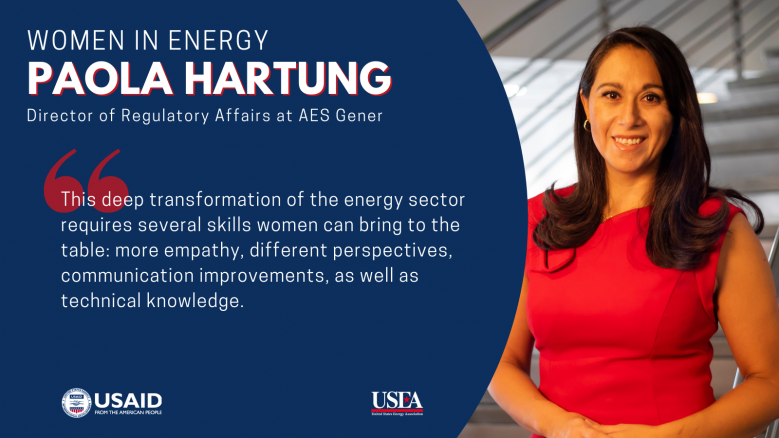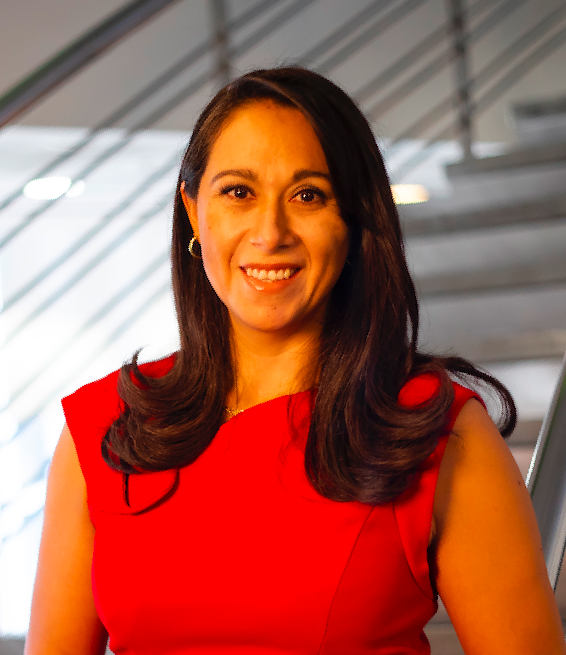
Women In Energy: Paola Hartung Martinez

The Women in Energy series is a joint project between USEA and USAID that was developed out of USEA’s Engendering Utilities Partnership, a program funded by USAID to improve gender policies and gender outcomes at their respective organizations. Every month we feature a woman who has shown exemplary leadership. The women highlighted come from diverse backgrounds and roles, and they bring with them a unique perspective to gender equality within the energy sector.
Paola Hartung Martínez is May's Women In Energy honoree. She currently serves as the Director of Regulatory Affairs of AES Gener, a generation company with presence in Chile, Argentina and Colombia. AES Gener is the second largest generation company in Chile in terms of installed capacity and the first in terms of generation for the past 4 years.
Prior to joining AES, she served as Regulatory Affairs Manager of Enel Generation Chile, with a 7,000 MW portfolio, Enel Green Power Chile, Peru and Colombia, and at the Chilean Grid Operator of the North System of Chile. Paola also has experience in the public sector. She began her professional career in the Electrical Department of the National Commission of Energy, of the Ministry of Energy.
Throughout her career, Paola has actively participated in the Chilean Energy Transition, both in the materialization of the first 1,200 MW of large renewable energy plants in Chile and another 340 MW in Peru, as well as boost the development and growth of the transmission system required by the Chilean and Colombian electrical systems, in order to enable the growing penetration of wind and solar energy from areas with high availability of renewable resources.
Paola currently serves as Vice President of the Chilean Association of Renewable Energy and Storage (ACERA) and as Director of the Chilean Association of Energy Law and Regulation (ADEREN).
“Throughout my professional career I had to work very hard on the communicational aspects that are key to share, work and specify all those ideas and proposals that have allowed us to carry out the adjustments to the Chilean electricity market through an energy transition as disruptive as the one experienced today in Chile,” Paola said in her interview.
How have your education and career path led you to where you are now?
I’m very proud of being an electrical engineer. It is known that not too many women choose this kind of career. I studied at regional university, and we were not more than five women among all the students. So of course, it is part of my history being from one province and being a woman, and it was not easy, but this gave me another point of view of everything. While attending the university, I received a comprehensive training, in terms of technical and certain managerial skills. Throughout my professional career I had to work very hard on the communicational aspects that are key to share, work and specify all those ideas and proposals that have allowed us to carry out the adjustments to the Chilean electricity market through an energy transition as disruptive as the one experienced today in Chile. The mix of all this knowledge and training makes me what I am today.
What obstacles have you experienced as a woman pursuing an education and career in the energy industry? What obstacles do women vying for leadership spots face in this sector?
In Chile, energy used to be an industry with no women in technical areas at all. I think I might have been one of the first few women here pursuing a growing professional career in public and private organizations of the energy industry. The challenges of the career are maybe the same you had to face on the educational stage… after getting the validation of your classmates and professors, everything changes for good. But maybe this previous validation is something men haven´t had to face very often. These kind of barriers or challenges are what makes a woman a “super woman.” I’m also a mother, so every woman who reads this will understand what that means. When you are a mom, you have a double job, and it´s another challenge to work hard to get your personal and professional goals, do a great job as a manager, and be an inspiration and example to the next generation… when you get home. That is what being a leader means.
Technology is transforming the traditional utility business model into a more modern interactive grid. Some utilities view this transformation as an opportunity to focus on innovation and diversity, which research shows drives better business performance. How is your organization attracting, retaining, and promoting more women into senior management positions to respond to this industry transformation? Is company data on this publicly available?
AES runs several training programs in order to develop capabilities and skills in: Data-driven analysis, networking, accountability, collaborative environment, customer focus, and innovation. This training is focused on measuring and assessing the gap in all of our professional women and then, closing the gap in each professional. In addition, we are working on the succession plan where identified talented women with best skills replace leadership positions in close terms.
Also, the Ministry of Energy of Chile is working on this. “Energía + Mujer” is a catalyst initiative that led to the design and execution of a voluntary “Public-Private Plan” with the Chilean energy industry and its supply chain. It began at the end of 2016, and currently 64 companies, unions, and institutions that involve about 25,000 workers have joined.
Of the 10 axes of this program, I´ve been contributing to the Strategic Dimension, helping the Ministry to encouraging companies in the renewable sector to incorporate diversity and inclusion issues in their Corporate Policies, and in the Structural Dimension, opening spaces to add more women to decision-making. Of course, AES is part of this great initiative too.
What changes in the sector at large do you think have launched more women into leadership positions?
I strongly believe that the simple presence of more women in the industry, at all levels, has allowed access per se to leadership positions due to their own merits. So, if we can assure the same number of candidates of both men and women to a new position, that could be a good way to equalize opportunities. This deep transformation of the energy sector requires several skills that women can bring to the table: contributing more empathy, different perspectives, communication improvements, as well as technical knowledge. AES is one of the leading companies in the energy transition, and we are convinced that this change should include diversity and inclusion.
What are some untapped actions the energy and electricity sector could focus on to accelerate change, increase diversity, and foster a better gender balance in the boardroom?
There are still some positions in the energy industry that are mostly performed by men. The construction and operation fields need to make a guided effort to include more women, so they can develop more specific know-how of the business. That could enrich the list of attributes of a female candidate in her future career within the company – promoting female students in all types of careers that are useful to the energy industry, not only legal, marketing, commercial, or communication roles, but also all kind of technical, operatives, and on-site jobs. In the Chilean energy industry, we still have a big challenge: increase the number of women on boards. Of the workers in this sector, 23% are women, but only 10% can reach these kinds of positions where decisions are made. So, we have a great opportunity to improve the performance and results of public organizations and private companies in our country by increasing these numbers.

